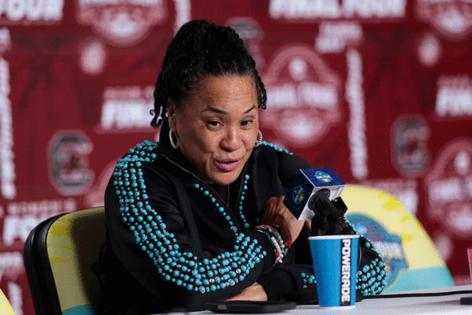Dawn Staley again advocates for the WNBA in Philadelphia, but not to be the head coach: 'I want ownership'
Published in Basketball
PHILADELPHIA — The question drew a rapturous applause Friday night inside Enon Tabernacle Baptist Church. Some attendees rose from their seats into a standing ovation.
And it initially looked like Dawn Staley would maneuver around whether she had interest in coaching a hypothetical WNBA expansion team in Philadelphia. She appealed to those fans by assuring them that “Philly’s ready” for a franchise. She reminded them that starting a brand-new team comes with “growing pains in the form of years,” and quipped that “we’re not built for that” by citing the crowd’s earlier collective reaction to her mentioning the 76ers.
And then, Staley said this: “I don’t want to come back and coach, OK? I want ownership.”
Staley, the local basketball legend, has long been an advocate for the WNBA in her hometown. An initial step has been taken, after the Sixers and Comcast officially made a bid for a team earlier this year. Several markets are hoping to join the growing expansion list after the Golden State Valkyries, who just began their inaugural season; the upcoming Toronto Tempo; and still-to-be-named Portland team.
Staley’s latest WNBA-related comments were a highlight from an event hosted by Uncle Bobbie’s Coffee & Books to promote her new book, Uncommon Favor. Though Staley just finished her 17th season at South Carolina — and 25th season coaching overall — the night included several references to her roots. Moderator Jess Sims, the popular Peloton instructor and a media contributor, began the conversation with this excerpt: “Dawn Staley is from North Philly, which means she can do anything.”
Here are three other takeaways from the conversation with Staley:
Temple made
Staley recounted Temple’s pursuit to make her its women’s basketball coach while she was still playing professionally. She said she repeatedly told the school “no,” until agreeing to meet with the late Dave O’Brien while in town for the 2000 Final Four.
O’Brien, then Temple’s athletic director, had two questions. Can you lead? And can you turn women’s basketball around?
“Is that a challenge?” Staley said to herself, before being ushered into a conference room to (unknowingly) interview with the rest of the search committee.
She took the job about two weeks later. To maintain that dual career, Staley recalls getting her own workout in before her team’s practice, an example of “actually living out their dream right in front of them.” She also remembered players piling into a car to drive from Philly to Charlotte, N.C., to watch her play for the Sting. She elevated Temple into an NCAA Tournament regular.
Those experiences prepared her to make the jump to South Carolina, where she has won three national championships and become one of the sport’s best coaches of all time.
“Sometimes, people see more in you than you really see in yourself,” Staley said of Temple’s pursuit of her. “… But it was the best decision that I’ve ever made. I’m forever indebted to basketball for all it’s given me, and I feel like coaching helps to pay down that debt.”
Equal pay
Staley is now the highest-paid coach in women’s college basketball after signing a contract extension in January with a starting annual salary of $4 million that runs through 2029-30.
But it took strong conviction — and negotiation — to reach that level. In 2021, she first asked for pay equal to then-South Carolina men’s basketball counterpart Frank Martin and hired a local attorney to handle the process she said took about five months. Then, she asked for more following the Gamecocks’ undefeated run to the national title in 2024.
“When you ask for equal pay, it takes people aback,” Staley said. “… But you‘ve got to be patient because you‘re asking someone to do something they’ve never done before.”
Staley added that she wants to see that pay gap continue to decrease across women’s sports and encouraged attendees to support their favorite teams by buying merchandise and engaging on social media.
“We don’t get what we deserve because they don’t think we’re a revenue-producing sport,” Staley said. “But we are a revenue-producing sport. It’s just the way that you count the revenue.
“I walk about six miles through campus. I see students that come up to me, and they say, ‘I came to South Carolina because I saw y’all win the national championship.’ They enrolled at South Carolina. Do you know how much it costs? That’s revenue that they do not count.”
Look. Sound. Feel.
Staley writes in Uncommon Favor that she did not always view herself as an instinctual leader, but that her “journey was one of a silent introvert, to the loud messenger.”
One mantra she follows, and introduces in the book: Look. Sound. Feel.
“We’ve all been in situations where something either looks, sounds, or felt wrong,” Staley said. “Like, ‘Did they really say that? Did they really do that?’ … It was just so off. And sometimes you either just go with the flow and not say anything — and I [was like that] for a long time — and then you find your voice. And then you become older, and over 50, and you don’t care.
“Young people in here, find out who you are sooner in your life. Because once you do, you won’t get taken advantage of.”
©2025 The Philadelphia Inquirer. Visit inquirer.com. Distributed by Tribune Content Agency, LLC.







Comments